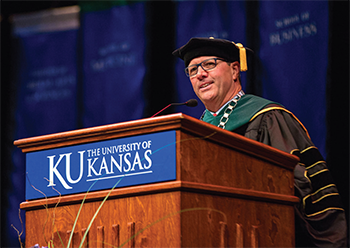
Chancellor Girod speaks to students and faculty during convocation at the University of Kansas.
© Andy White/University of Kansas.
Otolaryngologist Douglas A. Girod, MD, said he’s lucky enough to have had two very successful careers: First, he spent 15 years in the United States Naval Reserve, reaching the rank of Lieutenant Commander and served as vice chairman and research director in the department of otolaryngology at the Naval Hospital Oakland in California; and second, as professor, department chair, senior associate dean, interim executive dean, and executive vice chancellor at the University of Kansas Medical Center. On May 25, 2017, he was announced as the 18th Chancellor, overseeing the university and its roughly 19,000 undergraduates.
We recently spent a few minutes with Chancellor Girod to find out what it’s like to move between careers, how he maintains his clinical practice, and what challenges he sees for otolaryngologists in the future.
ENTtoday: What was your experience in transitioning from the Naval Reserve to a university medical center? Was anything easier or more difficult than you expected?
Dr. Girod: While I was assigned to the U.S. Mercy, the ship was in port and didn’t go out during my tenure. I really was stationed at the naval hospital, which was one of four teaching hospitals in the area. That made my experience much the same there as at KU, as I was at an academic teaching hospital. We received Department of Defense funding for research, and were really able to largely engage in an academic practice.
One of the things that took me to the University of Kansas was that one of my research collaborators from the University of Washington had moved to Kansas. The opportunity to start a head and neck surgery reconstruction program there was appealing. I went thinking I’d probably be there for just four to five years, but I’m still here after 24 years. I’ve found opportunities that allowed me to grow my career without leaving the university.
Otolaryngologists need to be engaged in the design of our working systems, in our political environment, and in what happens in the future of our practices for the benefit of our patients. You can either complain about problems, or be part of the solution. —Douglas Girod, MD
ENTtoday: What has changed the most in your otolaryngology practice since you’ve become Chancellor?
DG: In 2013 I became the University of Kansas Medical Center’s executive vice chancellor, and that’s when my academic role started to impact my practice. I had to significantly reduce my clinical time. Now, I really only see my established patients; I haven’t seen any new patients in the last year.
One of the things you appreciate most in practice—although maybe not always while you’re in the middle of it—is that what we do helps patients and makes a difference in the world. That’s why I went into my field: My role has been to perform cancer surgery that benefits patients in a real way, and to not be able to do that as often is difficult. Surgery is the one place where you largely can close out the rest of the world and focus on the task at hand. There’s a camaraderie between the students, fellows, and colleagues.
ENTtoday: What are some of the goals you hope to accomplish, either in otolaryngology, or overall, as Chancellor?
DG: I spent three to four years working on a metropolitan development plan, co-leading an initiative on the economy, where I learned just how important diversity in the workforce is, and I saw the opportunity to bring that into the university. The Lawrence campus is about 40 miles from th KU Medical Center campus, and sometimes that 40 miles can be 400 miles functionally. Through research collaboration, we’ve been able to bring our campuses closer, but there are opportunities to do more. As the state’s flagship university, we have the only school of medicine in Kansas, and that’s a big component of our mission.
We’re also in an environment where KU has more capacity than students, so for us it’s ensuring that we provide best opportunities for them to prepare for lifelong learning. University students today will go through an average of seven different careers in their lifetimes. We must prepare them for those challenges in learning, and for the rapid pace of emerging technology. We need to continue to drive our research mission in a way that serves our students, our economy, and our region. That might include collaborations with industry, spinout companies, and working with other agencies to meet infrastructure needs.
ENTtoday: What do you see as the biggest challenge(s) facing otolaryngologists today, and how have you been able to address it/them through your position as Chancellor?
DG: I think it’s finding the role of otolaryngology in the current environment of consolidation and mergers and acquisitions in medical systems. We work hard enough at that in our own medical system here, in that we’ve had massive growth over the last 15 years. We’ve become a successful department and recruited a lot of people, but we were also able to position them in leadership roles at KU. It’s become our biggest opportunity to help guide the system.
ENTtoday: What advice would you give to other otolaryngologists?
DG: Get engaged. We don’t have the luxury of just putting our heads down and doing what we do well. We need to be engaged in the design of our working systems, in our political environment, and in what happens in the future of our practices for the benefit of our patients. You can either complain about problems, or be part of the solution.
Amy E. Hamaker is a freelance medical writer based in California.